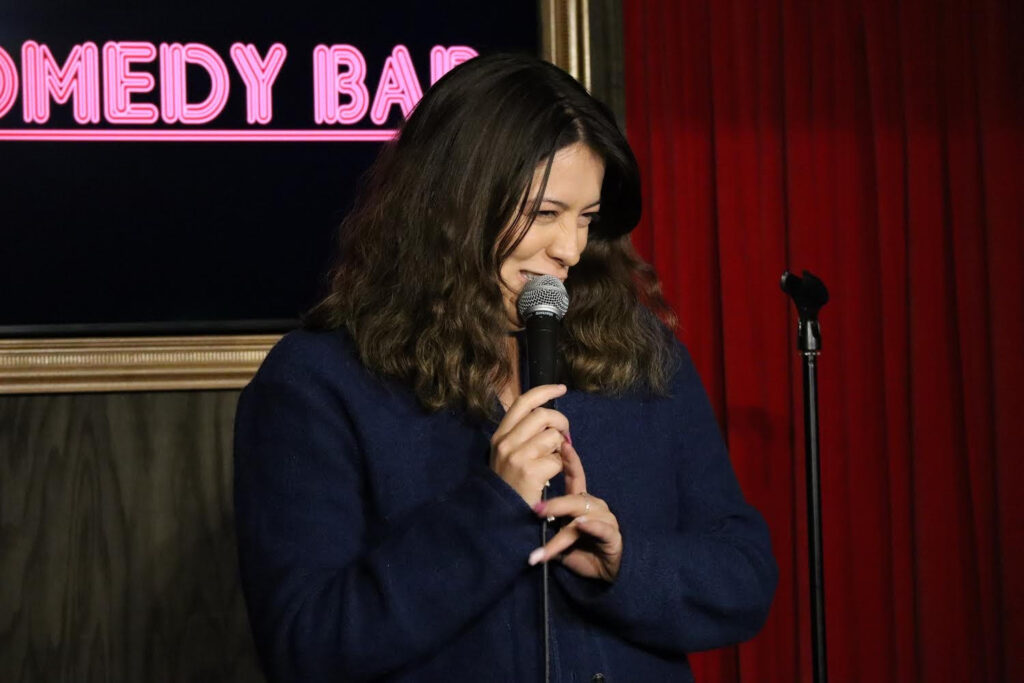
Michelle Forrester, a TMU student working on her MFA in Screenwriting and Story Design, spent last week juggling her classes with performing in Just For Laughs Toronto’s New Faces of Canada.
According to Just For Laughs’ Canadian Talent programmer and booker Neil Bansil, the New Faces program serves both as a launching pad for emerging comedic talent and an opportunity for comedy enthusiasts to be introduced to new acts.
“Immediately, what stood out to me about Michelle was how natural she was on stage. There was a calmness and an ability to connect to the audience in a way that is rare for comedians who have less experience in the craft,” explained Bansil in an email to On The Record. “When an artist has the ability to engage an audience and keep their attention, that is the first step to being great.”
We caught up with Forrester as she prepared for last weekend’s performances.
How did you come to be part of the New Faces of Canada?
I started in Montreal, and you can kind of grow quickly there because there’s not a lot of English comedy. And I was just into it from the beginning. Like, I did it once and then I was like, “I need to keep doing this because you just want to get better.” And the only way to get better is to continue to do spots and to continue to do stage time.
My best friend is a jiu jitsu World Champion, and I was like watching what her work ethic was. She practiced like 10 times a week and I watched her in three years just kind of soar to the top and I was very inspired by that. And so I just do all of the mics, like I’ll do the shittiest mic, I do everything, like I’ve done the worst rooms ever.
My second year I got asked to do this show called the Discovery Series in Montreal. It’s kind of pointing out rising talent and it’s in conjunction with JFL. That was really motivating to get because it was recognition from my own city. And then that was like my first year at JFL. I also got asked that year to do a JFL originals recording; if you get featured on the album it’s like great exposure.
I’m like, “okay, so this is working like I just have to continue working hard and stuff.” I also produced and I think producing helps get your name out there because like when you’re producing good shows, comedians are talking about you and they’re saying their name because comedians want access to more stage time. I was running a lot of shows in Montreal, so I think my name just kept coming up a lot.
Last year, I moved to Toronto and that was such a different game changer because the level here is just unmatched. I went from being one of the city’s better comics to getting to a city where now I get to be surrounded by people who are so good at what they do, who have all kinds of different backgrounds and you get to learn from them. I get to be around people that I’m like, “wow, these people are so much better than me” but I love that. Whereas I think if you stay in the city where you’re really strong and really good, you kind of grow a little bit complacent.
This year I got New Faces, which was crazy. [At] New Faces you have to showcase. I think the booker said he saw 700 comics and he selected 10. He liked my material, he connected with it. He saw it as something that was maybe different than what other people were doing. He was into it and then that’s how I got New Faces.
How did you decide to pursue your MFA in Screenwriting and Story Design?
When I was younger, I always wanted to write for TV. I always pursued it on the side but I had always understood that it was really hard to get into and that it was a job path most people don’t embark on because of how tough it was.
I graduated in communications, and there was no screenwriting Master’s program. So, I was like “I will just do a Media Studies Master’s but use that to write a script.” I had a friend who was at Toronto Metropolitan University in her undergrad, and she was like “the Media Production is a good MFA.” So, I’m on the website looking at that MFA and I see in the like bottom corner that they’re like “if you’re a screenwriter, apply to the script writing program.” I clicked on it, and it was brand new, like I’m in the second cohort.
How are you finding the MFA program in terms of contributing to your goals?
Your journey as a screenwriter is very similar to your journey as a comedian in the sense that it’s like there’s a lot of people vying for a little limited number of jobs, and it can be really demotivating because you’re constantly having to sell yourself and advocate for yourself and advocate for your ideas. So they usually go very well together.
I always thought that I was doing stand-up in order to get into a writers’ room. Now that I’m doing both, I love stand-up as my one love and then I feel like screenwriting comes a very close second. But you’re meeting a lot of the same people, like industry people will come and see comedians because they’re like, “okay, this might be someone that we represent, and they can maybe act or they can maybe write or they can maybe do all kinds of stuff.” Because that’s kind of what comedians do. They write stuff and then they act it out on stage.
How do you juggle your thesis and your classes with touring?
It’s very tiring. It’s not something I planned at all, it’s just something that kind of fell into my lap now. A lot of the time with these things, you want to work on the momentum of things. With New Faces, it’s a really great time to look for representation and capitalize on the opportunity.
Honestly, how I juggle it is I try my best and I communicate very actively with my professors and my co-workers. It’s important for me to show up where I can so I just do my best to keep up with both, but I think eventually there’s gonna come a time where I’m gonna have to be like, “I have to get my thesis done.”
What advice do you have for others who are interested in pursuing comedy?
My advice is to go for it. And then also just sounds so silly, but the point is that it’s fun. I think comedians get stuck about the perfect five minutes and the perfect jokes. At the end of the day, why it’s gonna be funny or why crowds gonna connect with you is because of you. Try and get to that place where you feel really comfy and you can just kind of just hang out with the audience.
This interview was edited for length and clarity.
Drew-Anne, or Drew, is a Master of Journalism student at Toronto Metropolitan University. She previously received an Honours BA in International Relations and Peace, Conflict, and Justice Studies. Her freelance work can be found in Ottawa Magazine and Spacing. She previously served as editorial fellow for This Magazine and is now the Head of Research at The Otter.

